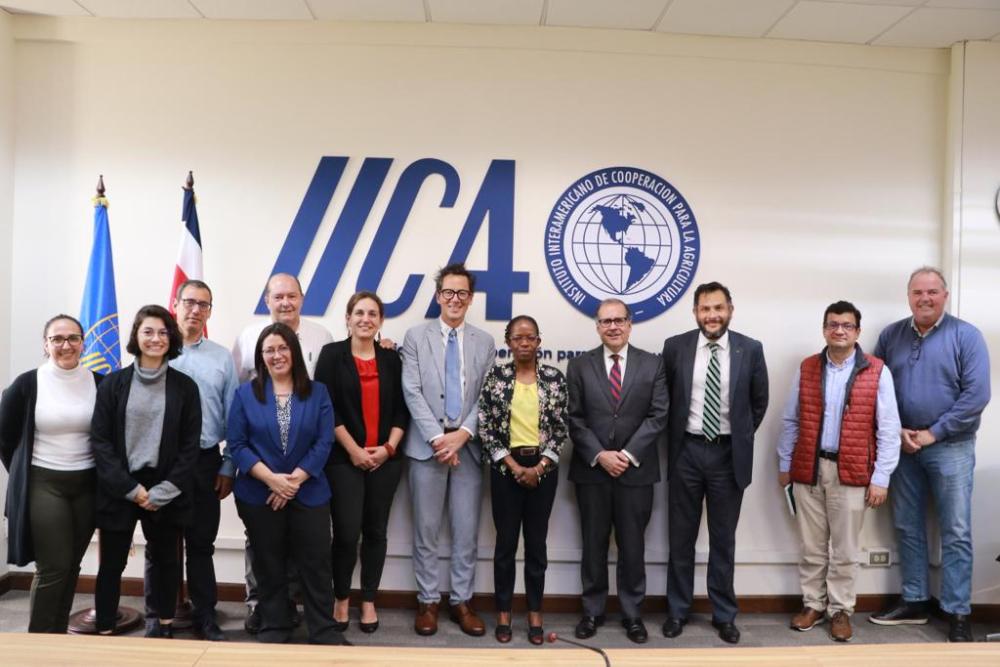The Green Climate Fund and IICA explore initiatives to channel more climate funding into agriculture in the Americas

San Jose, 18 August 2023 (IICA). The Inter-American Institute for Cooperation on Agriculture (IICA) and the Green Climate Fund (GCF) explored joint projects that will enable more climate funding to be channeled into Latin American and Caribbean (LAC) agriculture, thus fueling the transformation of the sector into one that is more resilient, sustainable and low in greenhouse gas (GHG) emissions.
The discussions took place during a visit to IICA’s Headquarters in San Jose, Costa Rica, by Marc Dumas-Johansen, Agriculture and Food Security Specialist in the GCF Division of Mitigation and Adaptation. He met with Lloyd Day, Deputy Director General of the specialized agency for agriculture and rural development, as well as with the technical staff of its Agricultural Climate Action and Sustainability Program, Directorate of Projects and Directorate of External and Institutional Relations.
Johansen explained that, “The idea is to identify the type of projects that we can jointly implement over the next four years. IICA is very important for our efforts in LAC. The GCF does not have many accredited agencies with experience in agriculture that are able to work in all the countries (of the region). The aim is to see how we can work together more closely on these new ideas for agriculture, and in which IICA has a wealth of experience”.
The GCF, which is headquartered in the Republic of Korea, is a fund created under the United Nations Framework Convention on Climate Change. Its mission is to assist developing countries to implement climate adaptation and mitigation practices.
In 2021, the IICA was accredited by the Fund to implement projects funded under its credit portfolio, thereby allowing the Institute to access resources in support of adaptation, mitigation and climate resilience initiatives in the agriculture and rural sector of countries in the Americas.
The IICA Deputy Director General confirmed that, “We want to work with the Green Climate Fund and other partners to improve agriculture in the Americas and the Caribbean and to prepare proposals on projects and initiatives that will assist the region’s farmers to improve climate resilience and to employ more sustainable production practices”.
Johansen explained that the GCF is updating its strategic plan, which will support a paradigm shift in all sectors, including the agrifood sector. The Fund hopes to assist more than 170 million people to adopt climate resilient and low emission agricultural and fishery practices between 2024 and 2027.
The Mitigation and Adaptation Division specialist also revealed that, “The new GCF strategy will concentrate more on transitioning to more sustainable systems, for example, agrifood systems – an area on which IICA has been focusing. The Institute can help us a great deal in the Caribbean and South America, where there are a variety of production systems. It is critical that we determine which type of transition to apply; how to progress together; what type of funding is important; and how to use this funding to create this transition, which is not easy. But we don’t have much time. If we are going to save the world, we must do it now”.
Proposals for projects on livestock production and agroecological practices
Johansen also emphasized that the GCF and IICA are working on various project proposals, including two that are progressing rapidly: one on livestock production in Mexico and the other on climate resilient production in the Caribbean.
The first of these, GANA-Mexico, aims to reduce GHG emissions and increase the climate change resilience of livestock production units and livestock landscapes, by promoting sustainable livestock production, through the application of best practices and low emission technologies that assist in boosting productivity, competitiveness and the improvement of ecosystem services in 10 states in that country.
On the other hand, the Caribbean Climate Resilient Farming project seeks to stabilize agribusiness in the context of climate change, by strengthening productivity and resilience, while working to reduce emissions through the implementation of agroecological practices that improve water and soil management; capacity building to reduce food losses; improved waste management; and the development of public policies to enable scaling up and sustainable adaptation and mitigation practices.
The Green Climate Fund specialist said that, “We are working with the IICA teams to determine how we can move forward with these proposals. There is a myriad of other things that we want to do, for example in digital agriculture. We would like to integrate this component more extensively into projects and to harness IICA’s networking ability in the countries, its hemispheric presence and its 80 years of experience”.
Moreover, he stressed that, “One project can’t change everything, but it can serve as inspiration for others. If we have a project that demonstrates how to create change in a more practical, easier and faster way, we have solved a large part of the problem”.
Kelly Witkowski, Manager of IICA’s Agricultural Climate Action and Sustainability program, indicated that concluding initiatives of this kind in close collaboration with the GCF is essential, in order to capitalize on the potential of the agriculture sector of the Americas to contribute to climate solutions. “We need to reduce emissions, and to foster adaptation and resilience, if we wish to continue maintaining the millions of livelihoods in the region, while ensuring food security and the other benefits provided by the agriculture sector”.
In closing, Witkowski insisted that, “The sector cannot change if the incentives do not change, if we do not have the funding to enable farmers to implement these changes, and if we do not overcome some of the barriers that are preventing greater resilience and reduced emissions in the region. Channeling funding towards rural areas is essential to facilitate climate action”.
More information:
Kelly Witkowski, Manager of the Agricultural Climate Action and Sustainability Program, IICA.
kelly.witkowski@iica.int